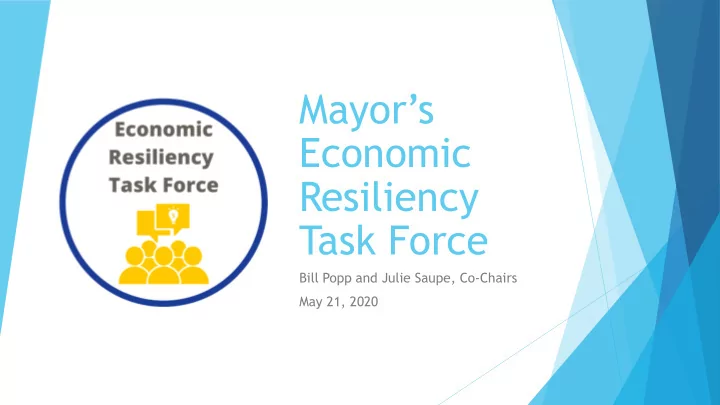

Mayor’s Economic Resiliency Task Force Bill Popp and Julie Saupe, Co-Chairs May 21, 2020
The First Nine Weeks of the ERTF ERTF formed at 9am on March 16 Now consists of 24 members representing business organizations, non-profits, and businesses from across Anchorage Staff support for ERTF provided by Anchorage Economic Development Corporation, Municipality of Anchorage, Anchorage Community Land Trust
ERTF Mission To identify and propose immediate actions to local, state and federal policy-makers to mitigate the impacts of COVID-19 pandemic to Anchorage employers, employees and nonprofits; to identify post-COVID strategies to build economic resilience and improve future response capacity; and to be a credible, accessible source of information and resources for the Anchorage business and workforce sectors.
ERTF Working Group Structure 7 working groups consisting of ERTF members and community volunteers: Local Policy- Monica Emerton, Chair State Policy- Bruce Bustamante, Chair Federal Policy, Ethan Tyler, Chair Business Programs and Tactics- Jon Bittner and Jonathan White, Co-Chairs Workforce Programs and Tactics- Silvia Villamides and Nikole Nelson, Co- Chairs Minority, Disadvantaged Businesses and Workforce- Heather MacAlpine and Jasmin Smith, Co-Chairs Communications- Katie Dougherty and Emily Cohn, Co-Chairs
What We Have Learned In The Last 8 Weeks Our business and non-profit community was unprepared for such broad disruption, but rose to meet the situation Huge cash crunch affected broad swaths of businesses and non-profit organizations Coordination of messaging of key information a big gap Confusion a big issue for both businesses and workforce Rapidly unfolding relief efforts challenged by scale of disaster The rapid speed with which information is changing
Shared Recommendations Across All Groups Accessible Assistance Programs: Grants, not loans Inclusive of non-profits and sole proprietors Simplified applications and rapid deployment Waive or defer business fees and taxes where allowable and a moratorium on property tax based foreclosures Support for workforce; rapid unemployment dispersals and retraining opportunities Clear guidelines for businesses and customers, including campaigns to support the use of face coverings Highlight and support community programs designed to help local businesses or non-profits
Local Government Recommendations Provide clarity on essential vs non-essential workers and clear guidelines by industry sector for reopening Equal access to broadband to bridge the digital divide Provide informational resources in multiple languages The MOA utilities waive costs for non-profits until federal funds become available The MOA exempt stimulus checks from garnishment The MOA act to avoid the anticipated eviction tsunami as housing protections expire (Rent Relief pilot project)
State Government Recommendations That the state follows the US Chamber’s National Return to Work Plan when it comes to questions of insurance and privacy Waive commercial use permit and per person fees on public lands for the remainder of 2020; this acknowledges that with the downturn in tourism many of these businesses will not be able to utilize permits to their full financial potential Alaska Co-op Development Center to work with cottage industry to allow for online sales and allow cooperative take-over of retiring cottage industry businesses The State of Alaska create a single, easy to navigate job portal reference by region, job category, and skill sets
Federal Government Recommendations Expand current legislation to broaden the eligibility for a broader spectrum of non-profit organizations to access relief funds . Adding seasonal business protections and flexibility to relief funds to address needs and seasonal realities of tourism, fishing and construction businesses in Alaska. Reduce, ease or eliminate grant matching requirements for federal grant programs. Allowance for CARES and HEROES funding for State and Municipal revenue replacement. Fully Fund Unemployment Trusts: Increase the federal unemployment insurance reimbursement for self-funded entities to 100% of costs.
ERTF Direct Actions Communications strategy for all ERTF partners AnchorageStrong website and robust social platforms Text platform – connecting businesses to needed resources and services Key messages delivered Sharing and promoting all COVID-19 related orders, messages and events from city Promoting trusted sources for facts and information Developed and disseminated FAQs re: new laws related to the pandemic How to apply for loans and grants Be a hero. Wear a mask!
Looking To The Future Continue to advise all levels of government- Identify gaps and needs in relief programs Address likely new challenges as they develop: Processes to reopen the economy Home mortgages, rental market, homelessness Key facilities- Convention centers, airport, etc. Unemployment, reskilling, skills shortages New investments in Anchorage Anchorage will be a different city in the future. How do we influence that future in a positive direction to make our city more resilient and sustainable?
Thank you! Questions?
Recommend
More recommend